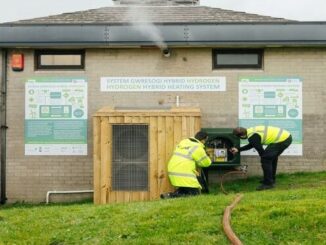
The UK government’s latest energy announcements include pledges for carbon capture and storage and the release of more oil and gas licenses in the North Sea, but they do not signal a reversal in the windfall tax.
Despite a review of the oil and gas sector’s tax regime, changes to the Energy Profits Levy will not be considered, and the windfall tax will remain in effect until March 2028.
The windfall tax, along with a special 40% corporation tax rate for oil and gas producers, has led to North Sea producers pulling out of domestic projects and has raised concerns about the UK’s investment climate.
Downing Street’s latest energy announcements this morning will not lead to a reversal in the controversial windfall tax, despite industry hopes of it being softened to make the country’s investment climate more attractive.
Many of the new measures were trailed in the media before they were announced this week, including the pledges for carbon capture and storage and at least 100 more oil and gas licences in the North Sea.
These proposals will likely provoke a reaction from climate protestors and activists, including Just Stop Oil – which have been active with demonstrations across the country since last summer.
But Prime Minister Rishi Sunak appeared to pull a rabbit out of the hat with confirmation of a review of the oil and gas sector’s tax regime, with a potential announcement later this year.
This will not , however, mean the windfall tax – first introduced by Sunak and toughened under Chancellor Jeremy Hunt – will be removed any time soon.
Five more years of government windfall tax
In its call for evidence from the industry, the government confirmed that the focus is on the long-term investment climate of the North Sea, and that changes to the Energy Profits Levy will not be considered.
For now, it appears Downing Street considers its recent introduction of a so-called ‘price floor’ – the Energy Security Investment Mechanism – will be sufficient.
This withdraws the windfall tax when oil prices decline to $71.40 per barrel and gas prices slide below 54p per therm.
Brent Crude oil is currently priced at $85.10 per barrel, while gas is priced at 67.7p per therm on the UK’s benchmark, well above the thresholds.
In contrast to industry hopes, the consultation will focus on the investment climate beyond March 2028, when the Energy Profits Levy will finally conclude, so the windfall tax should stay until then.
Robin Allan, chairman of the association, told City A.M. he welcomed today’s announcement of funding for new carbon capture projects and at least 100 further North Sea oil and gas licences, but warned that that the country’s “broader fiscal regime remains uncompetitive.”
“We look forward to responding to the planned review of taxes on the sector. Whilst we remain concerned that the UK’s broader fiscal regime remains uncompetitive, this consultation will be a great opportunity to review net zero capital allowances, which can support the North Sea oil and gas sector’s commitment to decarbonise the supply chain.”
This perspective was backed by Ithaca Energy, which argued that “fiscal stability is paramount for the industry given the large and long duration of capital investments.”
A spokesperson told City A.M.: “The Energy Profits Levy in its current form continues to impact investment across the UK North Sea with windfall taxes remaining despite softening in commodity prices and profits no longer being windfall in nature.”
Government faces challenge to woo North Sea
As it stands, the Energy Profits Levy is set at 35 per cent and runs through to its end date despite fossil fuel prices and wholesale costs easing – with the government not expected to trigger its price floor at any point over the next five years.
This is on top of the special 40 per cent corporation tax rate oil and gas producers pay – nearly double the rate of other industries.
The tax has contributed to North Sea producers pulling out of domestic projects.
So far this includes Total slashing ?100m plans to work on an infill well on Elgin this year, Enquest planning to leave its Kraken field in the North Sea to “natural decline, and Harbour Energy cutting jobs at its Aberdeen base alongside shifting investment to the US and South America.
Meanwhile, Ithaca Energy has been locked in talks with the government over the UK’s investment climate before it moved forward with commitments for Rosebank, as first reported by City A.M.
Loading…



